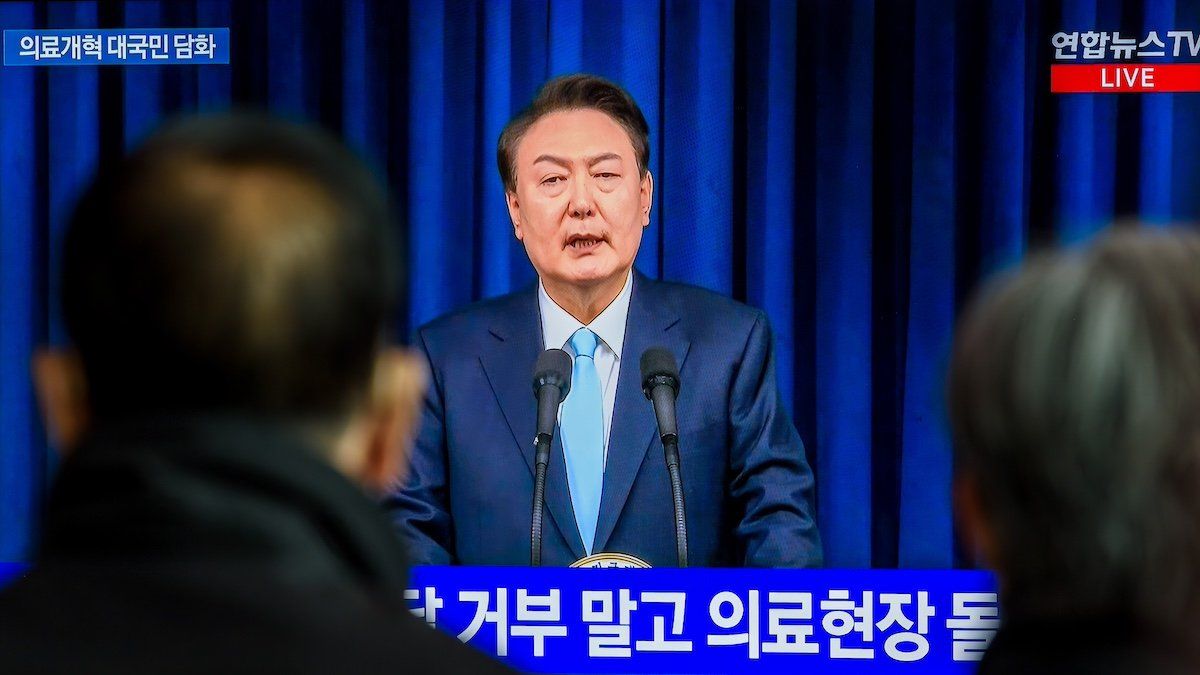All 300 seats in South Korea's unicameral legislature will be up for grabs in the April 10 election, offering President Yoon Suk-yeol the opportunity to kickstart his agenda if his conservative People Power Party, or PPP, can gain control of the National Assembly. The center-left Democratic Party of Korea, aka DP, currently holds a majority of the seats in the chamber and has frustrated Yoon’s efforts to advance business-friendly policies since he took office in 2022.
Nonetheless, the PPP faces long odds in flipping the chamber, according to Eurasia Group expert Jeremy Chan. We asked him to explain.
Why the poor prospects for the PPP?
The conservative party would need to gain roughly three dozen seats to recapture the National Assembly, a tall order that will be made even more challenging by Yoon’s low approval rating, which hovers below 40%. While his name will not appear on the ballot, the election is widely seen as a referendum on Yoon’s administration.
For Yoon, failing to recapture the National Assembly would effectively render him a lame duck with more than half of his term in office remaining. It would put his agenda of cuts to taxes and government spending on life support and make him the first Korean president in decades to serve an entire five-year term without ever exerting control over the legislature. Attention would promptly shift to the race to succeed Yoon in the 2027 presidential election.
What are the main issues for voters?
The state of the economy is at the top of the list, particularly sluggish growth and worrying debt levels for households and corporations. A recent rebound in Korea’s export sector — largely driven by an uptick in global demand for Korean semiconductors — has provided a bit of a tailwind to the economy, but overall sentiment remains negative. Voters are likely to hold the ruling conservative party responsible for this situation, even as the opposition in the National Assembly has watered down many of Yoon’s business-friendly reforms, which are meant to stimulate growth.
Scandals and other allegations of impropriety are another top voter concern. Many left-leaning voters find Yoon’s leadership style imperious, particularly his attacks against critical media outlets. His wife, Kim Keon-hee, is also a lightning rod for public criticism, with Yoon postponing a trip to Germany and Denmark in February to keep her out of the spotlight; if left-leaning opposition parties hold onto the National Assembly, they are likely to open an investigation into allegations that Yoon’s wife received unreported gifts and committed other misdeeds. Meanwhile, the leader of the DP, Lee Jae-myung, continues to face his own corruption investigations, which has decreased support for the main center-left opposition party.
What can this election tell us about the state of Korean politics?
Polls suggest that the election will likely be decided by a narrower margin than the last legislative election in 2020; the top two candidates in roughly 60 single-member districts are polling within the margin of error. Tempers are also running high in Korea, where political polarization has worsened in recent years. Both Yoon and Lee — the runner-up in the 2022 contest — are divisive figures, which has increased support for splinter parties, most notably the newly formed Cho Kuk Innovation Party. Korean politics have traditionally been dominated by two major political parties, but this election may be a harbinger of a more pluralistic system to come. With 30 of the 300 seats in the National Assembly to be allocated to non-major parties, chances are high that neither the PPP nor the DP will secure an outright majority.
Will the election outcome change Korea’s relations with the US, Japan, China, or North Korea?
This election will not have a significant effect on Korea’s foreign policy. Regardless of the outcome, Yoon will retain wide latitude over Korea’s external relations, including in diplomacy, security, and trade. Yoon will continue to deepen Seoul’s ties with Washington and Tokyo — he will participate in a trilateral summit with US President Joe Biden and Japanese Prime Minister Fumio Kishida on the sidelines of the NATO summit in Washington in July — while relations with Beijing and Pyongyang will remain strained. The US is on the verge of overtaking China as Korea’s top export market, and Korean firms are increasingly directing their investments away from China. By the time Yoon steps down in 2027, his successor will face a remarkably different external environment than the one Yoon inherited in 2022.
If the conservative party manages to pull off an upset, how will that change the political landscape in Korea?
A conservative victory in the legislative elections — not likely but also not unthinkable — would breathe new life into Yoon’s presidency. His administration would move quickly to enact a raft of business-friendly reforms, including lowering taxes on corporations and increasing government support for small- and medium-sized enterprises.
“Strategic” industries such as semiconductors, electric vehicles, batteries, biotech, and AI would likely benefit from greater policy attention. And Lee would come under increasing pressure to step down as head of the DP.
A PPP-controlled National Assembly would also put wind in the sails of the government’s recently announced “Corporate Value Up Program.” The program is designed to reduce the “Korea discount” whereby domestic firms have lower valuations than peer companies in Japan and Taiwan; it promises tax credits and other incentives to firms that “value up” their stock price through increased dividend payments, share buybacks, and improvements to their corporate governance.
